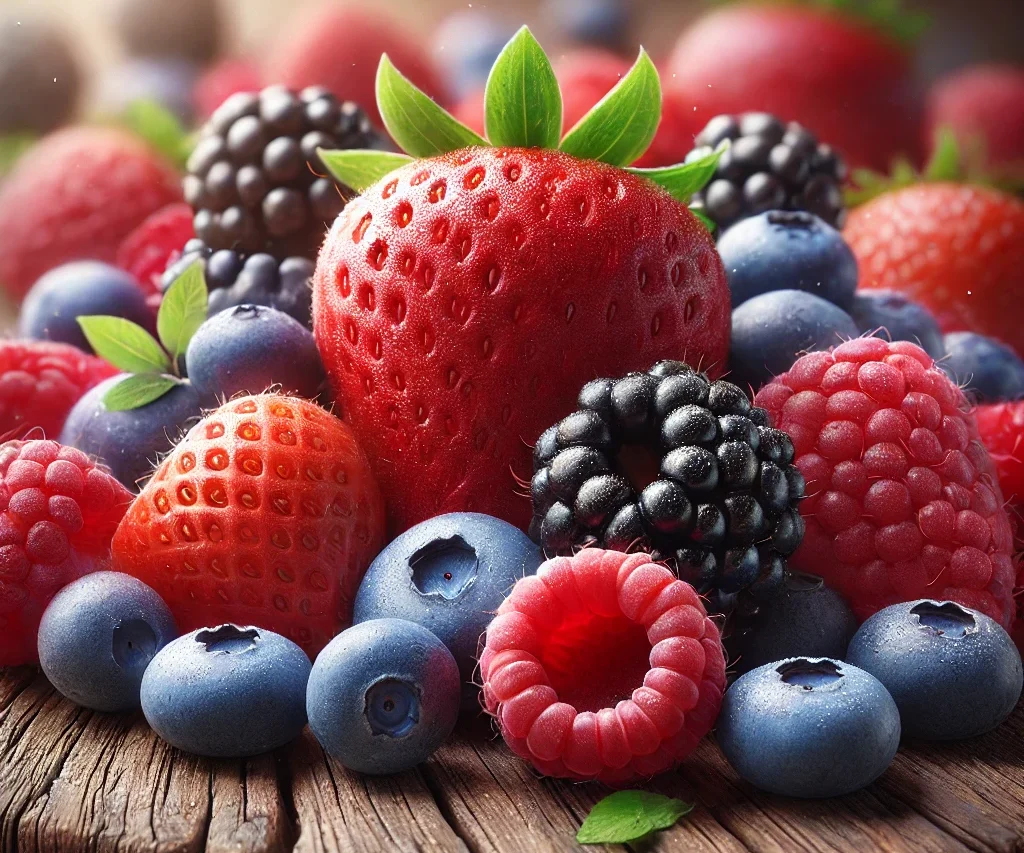Berries, including strawberries, blueberries, raspberries, blackberries, and others, are often referred to as “superfruits” due to their exceptional nutritional value and powerful health benefits. These small, vibrant fruits are packed with vitamins, minerals, fiber, and antioxidants, making them a staple for a health eating.
Health Benefits of Berries
Rich in Antioxidants: Berries are loaded with antioxidants like anthocyanins, quercetin, and resveratrol, which help neutralize free radicals, reduce inflammation, and lower the risk of chronic diseases.
Boosts Heart Health: Regular consumption of berries has been linked to reduced blood pressure, improved cholesterol levels, and a lower risk of heart disease due to their ability to improve blood vessel function and reduce oxidative stress.
Supports Brain Health: The antioxidants in berries, particularly blueberries, have been shown to improve brain function, delay cognitive decline, and enhance memory.
Promotes Healthy Digestion: Berries are high in fiber, which supports gut health by promoting regular bowel movements and nourishing beneficial gut bacteria.
Aids in Weight Management: Low in calories but high in fiber and water content, berries are a satisfying snack that can help control appetite and support weight loss efforts.
Strengthens Immunity: The high vitamin C content in berries, especially strawberries, boosts the immune system, helping the body fend off illnesses and infections.
Improves Skin Health: Berries are rich in vitamin C and antioxidants that promote collagen production, reduce wrinkles, and protect the skin from damage caused by UV rays and pollution.
Regulates Blood Sugar Levels: Berries have a low glycemic index and contain compounds that can improve insulin sensitivity, making them a great fruit.
Common Types of Berries
Strawberries: Bright red and sweet, popular for eating fresh, in desserts, and in salads. They are rich in vitamin C and antioxidants.
Blueberries: Small, round, and blue-purple in color. They are known for their high antioxidant content and are often used in smoothies, baked goods, and cereals.
Raspberries: Delicate, red or black fruits with a sweet-tart flavor. They are commonly used in desserts, jams, and sauces.
Blackberries: Dark purple to black and have a sweet, juicy flavor. They can be eaten fresh, used in desserts, or made into jams and jellies.
Cranberries: Small, tart berries that are often used in juices, sauces, and baked goods. They are known for their health benefits, particularly for urinary tract health.
Goji Berries: Small, red berries often found in dried form. They are popular in health foods and smoothies due to their high antioxidant content.
Acai Berries: Small, dark purple berries from the Amazon rainforest. They are often used in smoothie bowls and health supplements for their antioxidant properties.
Elderberries: Elderberries are small, dark purple berries that are often used in syrups, jams, and wines. They are known for their immune-boosting properties.
Uses of Berries
Culinary Uses: Berries can be eaten fresh, added to salads, blended into smoothies, or used in desserts like pies, tarts, and cakes. They can also be made into jams, jellies, and sauces.
Natural Sweeteners: Berries can be used as a natural sweetener in recipes, providing flavor and nutrition without added sugars.
Nutritional Benefits: Berries are low in calories and high in vitamins, minerals, and antioxidants. They are particularly rich in vitamin C, fiber, and phytochemicals, which can contribute to overall health.
Health Benefits: Regular consumption of berries has been linked to various health benefits, including improved heart health, better brain function, and reduced inflammation.
Safety Considerations
Allergies: Some individuals may have allergies or sensitivities to certain berries. It’s important to be aware of any food allergies.
Pesticides: Berries can be susceptible to pesticide residues. Washing them thoroughly or choosing organic options can help reduce exposure.
Storage: Fresh berries should be stored in the refrigerator and consumed within a few days for optimal freshness. They can also be frozen for longer storage.
Sugar Content: While berries are generally healthy, they do contain natural sugars. Individuals monitoring their sugar intake should consider portion sizes.
Ripeness: The ripeness of berries affects their flavor and sweetness. Look for berries that are plump, firm, and brightly colored.
Conclusion
Eaten fresh, frozen, and dried, berries offer a wide range of health benefits, from boosting brain and heart health to improving digestion and skin glow. With their versatility and rich flavors, berries are an easy way to enhance both the taste and nutritional value of your meals and snacks.
